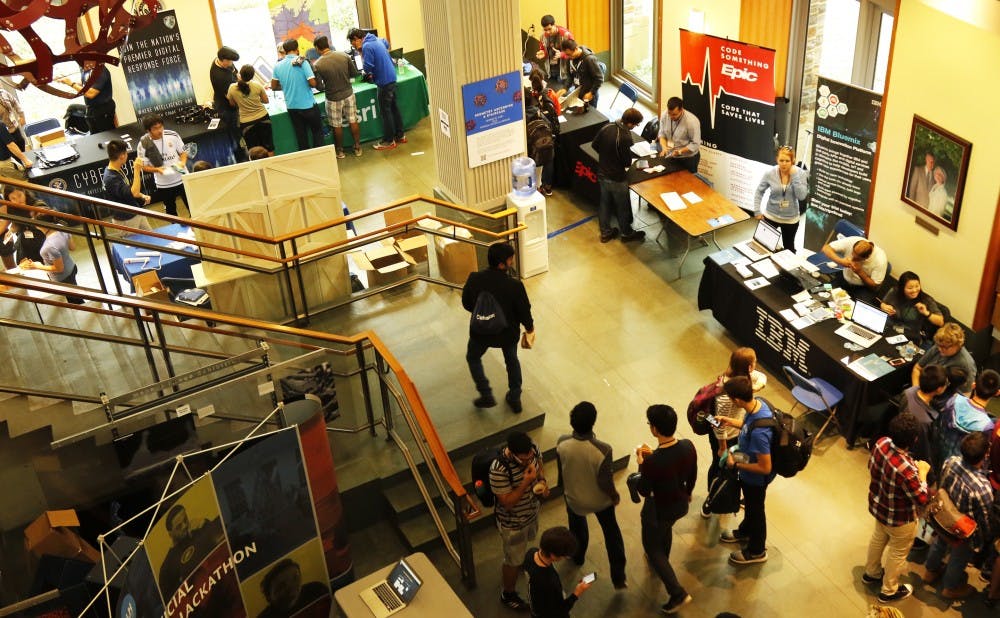More than 800 students from across the nation converged on the Fitzpatrick Center for HackDuke, Duke’s annual 24-hour coding competition, this past weekend.
This year, HackDuke continued its emphasis on “Code for Good” and strived to expand the coding community by welcoming first-time coders. Ninety-two projects were submitted featuring four tracks: Inequality, Energy and the Environment, Health and Wellness and Education. Company sponsors awarded prizes to many projects in addition to the winners of each of the four categories, who were able to donate their prize money to charities of their choice. There was also a special prize awarded to the winning team of first-time coders.
“It’s incredible to see all the bright ideas being turned into innovative projects in just a day,” said sophomore Tara Davis, media head of HackDuke. “We are also glad to see that non-participants came to the tech workshops we offered parallel to the main competition. Even though they weren’t competing, they learned the skills and benefited from HackDuke.”
The projects submitted included a wide variety of projects across each of the four tracks.
In the Inequality track, one team of Duke students developed online platforms to connect donors of used items with people in need. Freshmen Bill Yu, Parker Hao, Yuxiang He and Yuansong Feng created an app called WheeShare that was one of multiple projects to win “Best Hack that Impacts the Children’s Community.”
“When I was teaching as a volunteer in Kenya last year, I remembered how every school there hoped for a basic computer lab but was unable to find used computers for years,” Hao said. “But we knew there were firms in China that have a great amount of outdated computers that they were willing to donate. So we want to build a global platform to serve as the link between them.”
The app consists of two components—one called “I give,” where unwanted items can be posted for donation, and one called “I need,” where people can search and request certain items they need, Yu explained.
Yu, who served as the team’s iOS developer, said he joined the group just one day before the hackathon.
“I really learned a lot from this,” he said. “I thought I knew a lot about programming, but it was totally different when you are really developing a project. I think my skills improved a lot.”
Another group of Duke students created a hardware project called LM-Rehab, which aims to help patients with hand disabilities do rehabilitation exercises at home. When patients open the web app, they can complete the exercises assigned by their doctors using a Leap Motion sensor. The data is analyzed using rotation transformation, and feedback is given for how well the patients completed the exercises, explained freshman Wilson Zhang, a member of the LM-Rehab team.
“The most special part about HackDuke is the ‘Code for Good’ theme,” Zhang said. “Coding is not about showing off your skills. Coding should have deeper meaning—making real changes.”
The “Code for Good” theme also helped attract the approximately 200 students from other universities that participated in this weekend’s competition.
Juniors Ganapathy Narayan and Jagannath Srinivasan from the Georgia Institute of Technology said they chose to participate in HackDuke over three other competitions that were also happening this week.
“You don’t get such cool themes as ‘Code for Good’ in other hackathons,” Srinivasan said. “Generally hackathons are open nature, but this theme can push you to solve real problems. And it’s really interesting that the prize would be donated to charities.”
The team that organized HackDuke spoke about plans for next year’s hackathon at the closing ceremony Sunday. One organizer noted that the theme might limit the scope of the projects, but likely will not change in the future because of the importance of social changes.
Representatives from the tech companies that sponsored HackDuke also spoke highly of the hackathon.
“It’s amazing to see how the organizers and participants collaborate to make this happen,” said one representative from Yik Yak at the ceremony. “Some of you turn your ideas into projects, some of you got stuck. Either way it’s fine as long as you are trying things out and getting fun out of it.”
Correction: This story was updated Monday morning to note that organizers said that the "Code for Good" theme likely will not change in the future. The Chronicle regrets the error.
Get The Chronicle straight to your inbox
Signup for our weekly newsletter. Cancel at any time.

